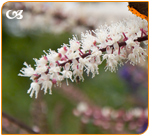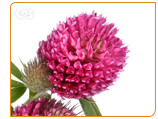Favorite Phytoestrogenic Herbs
Almost everything we eat � beans, grains, nuts, seeds, vegetables, fruits and roots � contains phytoestrogens, plant compounds that are able to mimic estrogen when introduced into the human body. Navigating the endless lists of phytoestrogens can be a daunting task but there are a few that standout from the rest. Read on to learn about 5 well-known phytoestrogen favorites to help relieve symptoms of menopause.
Soy
An excellent source of protein, iron, calcium, phosphorous and dietary fiber, soybeans are often regarded as the healthiest way to prevent bad cholesterol, cancer and coronary artery disease. Soy products come in many forms from soy sauce to milk and cheese.
Black Cohosh
 Although it’s not known exactly how this herb works, black cohosh is thought to contain isoflavones (a form of phytoestrogen) that bind to estrogen receptors in your body. It helps to relieve menopausal night sweats, depression, mood swings and regulate sleeping patterns. Because black cohosh has not been extensively studied, doctors recommend short-term use (6 months or less).
Although it’s not known exactly how this herb works, black cohosh is thought to contain isoflavones (a form of phytoestrogen) that bind to estrogen receptors in your body. It helps to relieve menopausal night sweats, depression, mood swings and regulate sleeping patterns. Because black cohosh has not been extensively studied, doctors recommend short-term use (6 months or less).
Dong Quai
Commonly known as the “female ginseng”, dong quai has been used for centuries in traditional Chinese medicines and is seen as the foremost herb for treating menopausal symptoms. In addition to containing vitamins E, A and B12, the phytoestrogens within dong quai work by binding to estrogen receptors in the body, thus increasing estrogen levels. This potent herb benefits menopausal women by dilating blood vessels and increasing blood flow which helps to alleviate vaginal dryness and reduce hot flashes.
Red Clover
 Lauded as the cure-all for menopause sufferers everywhere, red clover has shown to reduce mood swings, hot flashes and is believed to help fight the onset of osteoporosis. Studies done on red clover have shown that women that take a red clover supplement have a 44% decline in hot flashes over a period of several weeks.
Lauded as the cure-all for menopause sufferers everywhere, red clover has shown to reduce mood swings, hot flashes and is believed to help fight the onset of osteoporosis. Studies done on red clover have shown that women that take a red clover supplement have a 44% decline in hot flashes over a period of several weeks.
Ginseng
A root of Native America, the Chinese and Koreans, ginseng is believed to help increase life span and improve vitality after frequent use. Favored as a medicinal herb, ginseng impacts the body on a hormonal level through the compound ginsenosides. Phytoestrogens in ginseng increase estrogen in the body while ginsenosides help to increase stamina and energy. For menopause sufferers, ginseng acts as an “energizer” used to treat mental well-being and has proven to relieve fatigue, nervousness and stress.
Understanding how phytoestrogens work and how they can help treat symptoms is important to the sufferers of menopause. Click here to read more information on phytoestrogenic herbs.
Sources:
• “The Health Benefits of Soybeans.” www.elements4health.com
• Barret J.1996.Phytoestrogens.Friends or Foes? Environmental Health Perspectives 104: 478-482
• “Herbal Supplements for Menopause.”Epigee Women’s Health.www.epigeee.org



























